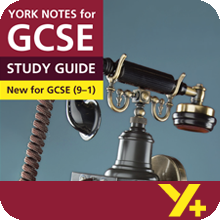Examiner's Notes
You assessed this answer as Grade 6.
Hover over the highlighted text to read the examiner’s comments.
Question: How does Priestley present Mrs Birling’s response to the Inspector’s visit?
Write about:
- what Mrs Birling says and does in the play
- how Priestley presents Mrs Birling’s response to the Inspector’s visit.
Sybil Birling’s aloof and contemptuous nature springs from feelings of social superiority and her character (along with her husband’s) is central to an understanding of the play. They symbolise everything that Priestley believes is wrong with the Edwardian ruling class: their individualism, their lack of responsibility to the community and their callousness.
Having been off stage since the celebratory dinner, Mrs Birling is unaware of the dramatic events that have taken place between Sheila and Gerald in the Inspector’s presence. In Act Two she bustles in ‘briskly and self-confidently, quite out of key’ with what has happened. Priestley’s stage directions sum up her complete failure to sense the mood. Sheila’s attempts to prevent her mother ‘building a wall’ against the Inspector – a metaphor for resistance – are met with bewilderment and annoyance. Inspector Goole’s plain speaking is met with an accusation of impertinence.
Sybil Birling is ignorant of how others, less fortunate, struggle, at a time when there was no welfare state. Her myopic view of the world prevents her from grasping that Eva Smith, whose suicide is the focus of the Inspector’s call, visited The Brumley Women’s Charity Organization in desperation. The pregnant young woman’s offence was to call herself ‘Mrs Birling’, another apparent impertinence and an irony lost on Sybil. She is unaware that her son Eric was the father of Eva’s unborn child. For Sybil, Eva Smith is one of the undeserving poor, so she cruelly uses her influence to refuse charity. Not only that, she takes the opportunity to tell the Inspector in no uncertain terms that the father should be held ‘entirely responsible’ and ‘dealt with very severely’. Another irony.
At the heart of Sybil Birling’s character and the reason why the Inspector is so unwelcome is her acute sense of propriety, respectability and status. Maintaining her family’s social standing without regard to the needs of the wider society is where she feels her duty lies. She is quite unable to understand Sheila’s attitude as her daughter tries to face the crux of the Inspector’s (and Priestley’s) rhetorical message; that social justice is crucial to society and that without it there will be ‘fire and blood and anguish’. For Sybil Birling anything troubling or unsavoury must be kept hidden. Much of her dialogue is peppered with warnings: ‘Careful what you say, dear!’ ‘Sheila!’ ‘Arthur!’ ‘Eric!’ The frequency of exclamation marks in her speech reveals anxiety as well as disapproval. Any whiff of scandal alerts her to danger, so she resists the Inspector’s interrogation until it is impossible to do so.
There are two occasions in the play where her chilly exterior crumples. The first is the climax of Act Two. We witness her ‘frightened glance’, as she realises that Eric is the father of the unborn child, leaving us to speculate on what scenes will follow in Act Three. The second occasion is when Eric, ‘nearly at breaking point’, damns her for killing ‘her own grandchild’. The audience is gripped as Sybil pleads that she didn’t understand that it was his child, and we see how this lack of understanding is part of her relationship with Eric. He accuses her of never having ‘tried’ to understand him. We do not know how she reacts to this. She says no more, and only speaks a few pages later to declare her shame at his behaviour. Is this an indication of her heartlessness or her inability to recognise her part in his unhappy life and alcoholism? Certainly, her recovery is remarkable once she thinks the Inspector is a hoax. All the previous revelations have been shuffled away in order to ‘behave sensibly’. For Sybil Birling the Inspector’s visit brings no epiphany, and we can only assume that she remains unchanged by all that has happened. Or does she? The Inspector, whether a man of insight or a mysterious prophet, warns her that she will ‘spend the rest of [her] life regretting’ what she did.
